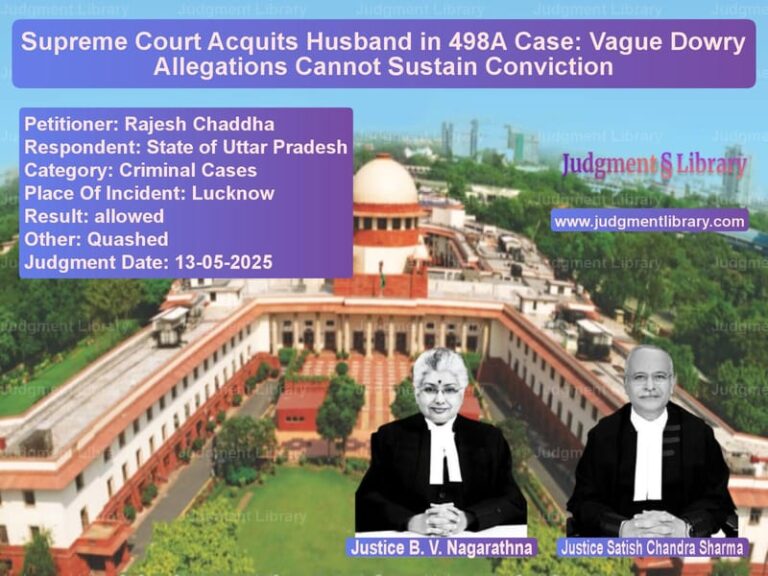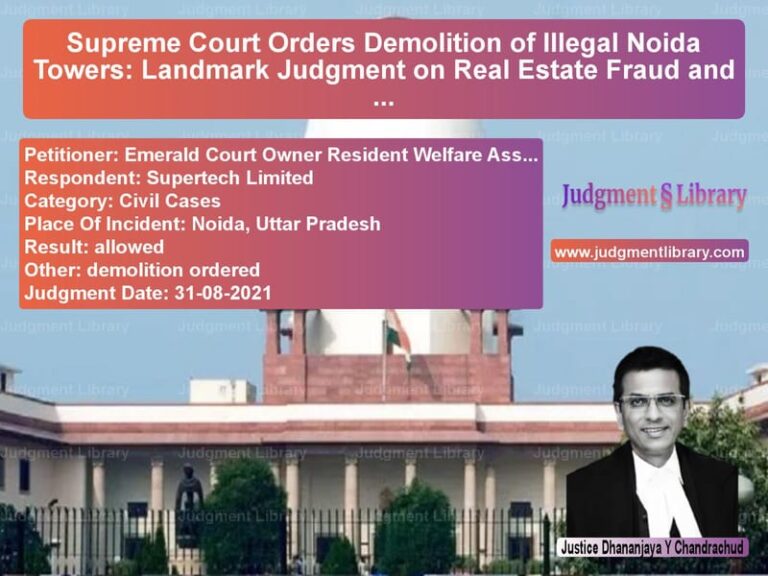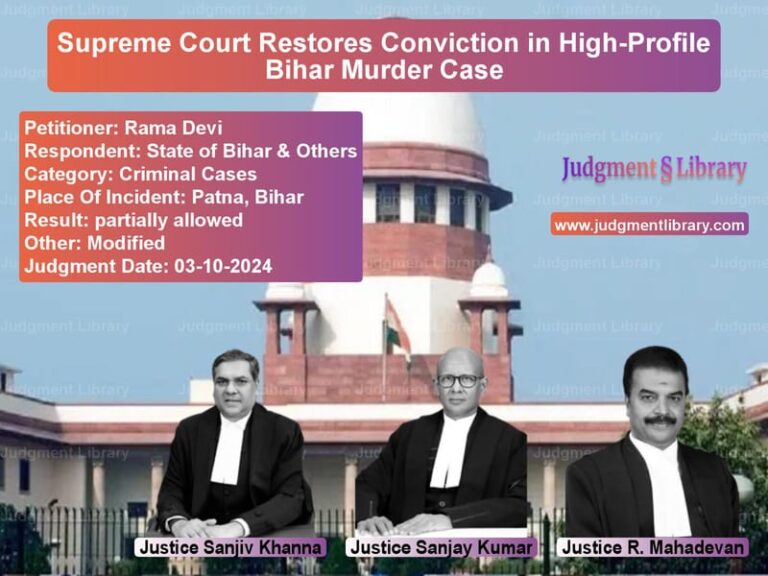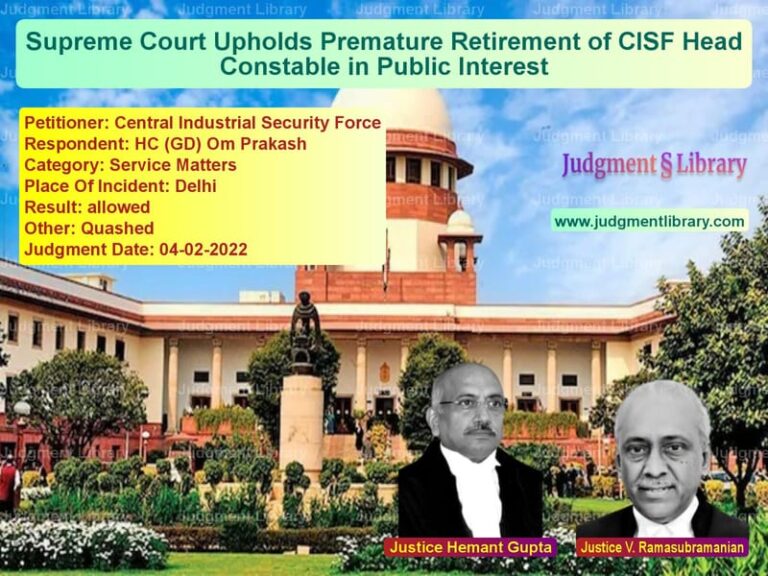Supreme Court Clarifies Deduction Rules for Compensation in Motor Accident Claims
The Supreme Court of India recently delivered a significant judgment in the case of New India Assurance Co. Ltd. vs. Kamlesh and Others, addressing the contentious issue of whether financial assistance received under the Haryana Compensation Assistance to the Dependents of Deceased Government Employees Rules, 2006, should be deducted from the compensation awarded in motor accident claims. The judgment, pronounced on April 28, 2025, by Justices Sudhanshu Dhulia and K. Vinod Chandran, provides clarity on the principles governing such deductions and reaffirms the binding nature of judicial precedents.
The case arose from a motor accident in which the deceased, a government employee, succumbed to his injuries. The Motor Accident Claims Tribunal awarded a compensation of Rs. 37,85,800/- to the legal heirs of the deceased. The Insurance Company appealed the decision, contesting the quantum of compensation, particularly the deduction allowed for financial assistance under the Rules of 2006. The claimants, on the other hand, sought enhancement of the compensation.
The High Court had enhanced the loss of dependency from Rs. 35,65,800/- to Rs. 45,14,986/-, applying the multiplier system as laid down in the Constitution Bench decision of National Insurance Company Limited v. Pranay Sethi and Others. However, the conventional heads of compensation were reduced from Rs. 2,20,000/- to Rs. 70,000/-. The total compensation was determined at Rs. 45,14,986/-, with half of the amount under the Rules of 2006 (Rs. 21,67,704/-) directed to be deducted, following the Punjab and Haryana High Court’s decision in New India Assurance Company Ltd. v. Ajmero and Others.
Dr. Meera Agarwal, learned counsel for the Insurance Company, argued that the deduction under the Rules of 2006 should be 100%, as held by the Supreme Court in Reliance General Insurance Company Ltd. v. Shashi Sharma and Others and followed in National Insurance Company Ltd. v. Birendra. She emphasized that the compensation claimed under the Motor Vehicles Act includes the component of loss of income, which directly relates to the pay and wages the deceased would have earned if he had survived. Therefore, allowing the claimants to receive both the compensation under the Motor Vehicles Act and the financial assistance under the Rules of 2006 would result in a double benefit.
On the other hand, Mr. M.R. Shamshad, learned Senior Counsel for the claimants, relied on the two-judge Bench decision in Helen C. Rebello v. Maharashtra State Road Transport Corporation, where it was held that life insurance amounts received by heirs on account of the victim’s death were not deductible from the compensation for death in motor accidents. He also pointed out that a Coordinate Bench in Rajkumar Agrawal v. Vehicle Tata Venture, Commercial Auto Sales Private Limited had referred the issue of whether insurance amounts paid under the Employees’ State Insurance Act, 1948, are deductible to a larger Bench, as there was no authoritative pronouncement on the subject.
The Supreme Court, after examining the conflicting precedents, held that the three-judge Bench decision in Shashi Sharma was binding and had to be followed. The Court noted that the Rules of 2006 provide compassionate assistance by way of ex-gratia financial assistance to the dependents of deceased government employees, and allowing them to claim the same amount as loss of income under the Motor Vehicles Act would lead to unjust enrichment. The Court emphasized that the principle laid down in Helen C. Rebello was distinguished in Shashi Sharma, as the latter specifically dealt with the deduction of amounts received under the Rules of 2006 under the head of pay and other allowances.
The Court also referred to the Constitution Bench decision in Pranay Sethi, which underscored the importance of adhering to binding precedents and the discipline demanded by the doctrine of stare decisis. The Court observed that the two-judge Bench decision in Krishna v. Tek Chand could not be agreed with, as it conflicted with the three-judge Bench decision in Shashi Sharma.
In computing the compensation, the Court held that the Tribunal should first calculate the loss of income under the Motor Vehicles Act, applying the principles laid down in Sarla Verma and Pranay Sethi, and then deduct the pay and allowances payable under the Rules of 2006. If the compensation under the Motor Vehicles Act is higher, the difference should be paid to the claimants. In the present case, the Court recalculated the compensation and arrived at a total of Rs. 7,86,119/-, after deducting the financial assistance under the Rules of 2006.
The judgment reaffirms the principle that while calculating compensation in motor accident claims, any amount received by the claimants that directly relates to the loss of income should be deducted to prevent double benefit. The decision also highlights the importance of judicial discipline and the binding nature of precedents, ensuring consistency and certainty in the law.
Petitioner Name: New India Assurance Co. Ltd..Respondent Name: Kamlesh and Others.Judgment By: Justice Sudhanshu Dhulia, Justice K. Vinod Chandran.Place Of Incident: Haryana.Judgment Date: 28-04-2025.Result: allowed.
Don’t miss out on the full details! Download the complete judgment in PDF format below and gain valuable insights instantly!
Download Judgment: new-india-assurance-vs-kamlesh-and-others-supreme-court-of-india-judgment-dated-28-04-2025.pdf
Directly Download Judgment: Directly download this Judgment
See all petitions in Motor Insurance Settlements
See all petitions in Compensation Disputes
See all petitions in Third-Party Insurance
See all petitions in Insurance Settlements
See all petitions in Judgment by Sudhanshu Dhulia
See all petitions in Judgment by K. Vinod Chandran
See all petitions in allowed
See all petitions in supreme court of India judgments April 2025
See all petitions in 2025 judgments
See all posts in Insurance Cases Category
See all allowed petitions in Insurance Cases Category
See all Dismissed petitions in Insurance Cases Category
See all partially allowed petitions in Insurance Cases Category







